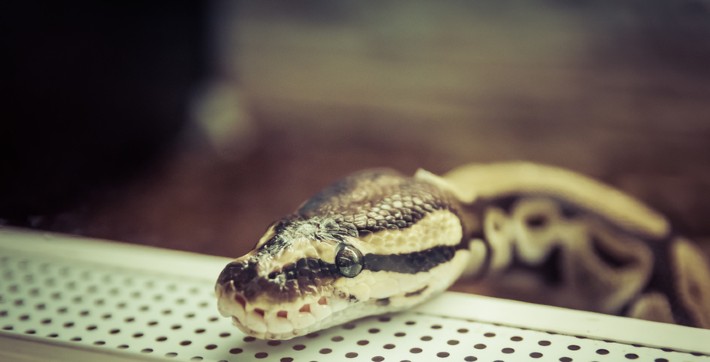Can I Own a Venomous Snake?

So, you want to own a venomous snake. The exotic and dangerous nature of venomous snakes is what inspires many pet owners to keep one for themselves. But owning a venomous snake is an incredibly dangerous endeavor, and it requires both ample research and extreme caution. One wrong move and you or anything that gets bitten by it will get sick or worse.
And then there’s the legality of owning a venomous snake. While some countries allow it with certain conditions, others ban the ownership of one entirely. Because different countries have their own separate set of rules, we’re here to give a quick rundown on the rules of some of them.
Owning a venomous snake in the US
The US is home to 50 different states. Each state has its own set of rules and regulations on what types of snakes you can own, and whether or not venomous snakes are legal to own. We’ll be focusing purely on venomous snakes, as laws surrounding non-venomous snakes are laxer by comparison.
You can break down all fifty states into three different categories based on venomous snake ownership – illegal, legal with a permit, and no regulations. Then there’s North Carolina, which we’ll be discussing in a bit.
Firstly, there are states that downright forbid ownership of any sort of venomous snake. These are the states of Arizona, California, Connecticut, Delaware, Florida, Georgia, Hawaii, Idaho, Illinois, Iowa, Kansas, Kentucky, Maryland, Massachusetts, New Hampshire, New Jersey, New York, Oregon, Tennessee, Vermont, Virginia, Washington, West Virginia, and Wyoming.
A little side-note: the states of Arizona, Delaware, Florida, Illinois, and New Hampshire only classify ownership of venomous snakes as illegal. In Delaware and Florida, you can own non-venomous snakes so long as you have the required permit. In Illinois and New Hampshire, you can own non-venomous snakes even without a permit, too. All the other states, however, ban the ownership of any species of snake, venomous or non-venomous.
Then, there are the states that allow legal ownership of venomous snakes so long as you have the required permit. These states are Indiana, Louisiana, Maine, Michigan, Minnesota, Mississippi, Missouri, Montana, Nevada, New Mexico, North Dakota, Ohio, Oklahoma, Pennsylvania, Rhode Island, Texas, and Utah.
Finally, there are states that allow you to own venomous snakes without a permit whatsoever. These are Alabama, Nebraska, South Carolina, South Dakota, and Wisconsin. You can get yourself a venomous snake without having to worry about owning the necessary permits.
And remember North Carolina? Well, they’re a special case. You see, the state has decided that snake ownership laws are to be decided at the county or municipality level. This means that some counties may allow ownership of venomous snakes, while others only allow non-venomous snakes, and some others ban ownership of snakes entirely.
When in doubt, be sure to check the rules and regulations listed on your state’s official website.
Owning a venomous snake in the UK
In the UK, you’ll need a license to be able to own venomous snakes. Owning a venomous snake isn’t common in the UK, with only 60 people or so with licenses back in 2018. In fact, only 300 hundred venomous snakes were recorded as kept by these 60 or so owners. This isn’t strange when you learn the fact that in all of the UK, only one native snake species is venomous.
Other than the license, though, the rules surrounding venomous snake ownership are, for the most part, vague. They aren’t as clear-cut as other countries, and you can get away with bringing a snake from other EU countries to the UK without too much legal trouble. It’s safe to say that owning a venomous snake in the UK isn’t nearly as popular of a hobby as it is in other places around the world.
Owning a venomous snake in Canada
If you’re thinking of catching a venomous snake and owning one in Canada, then you’re out of luck. The country’s federal law prevents ownership of any sort of wild animal, as stated by the BC Wildlife act. There are exceptions to this, and you can own a wild animal with a special permit, but these are only handed out by provincial governments on rare occasions.
When it comes to owning exotic animals, though, that’s a different story. Similar to how the U.S. has their states decide, Canada’s provinces each have their own rules on exotic animals. For example, provinces such as Manitoba allow ownership if you own the required permit. In Ontario, they follow a similar style to North Carolina, wherein the municipalities decide for themselves rather than the provincial government establishing the regulations.
Owning a venomous snake in Australia
Australia’s known for its many deadly animals and snakes are no exception. There are up to 100 species of snake in Australia that are considered venomous, with the venomous species outnumbering the non-venomous ones. Because of this, you’d best be careful when you see a snake at your doorstep.
When it comes to ownership, strict regulations have been put in place. Venomous snakes are categorized into three types depending on the severity of their venom. These categories each have their own separate permit that you’ll need to get in order to own snakes that belong in the group. There are some exceptions to this, with certain families such as tiger snakes and copperhead snakes unobtainable even with a permit.
Finally, exotic snakes are not allowed to be owned in Australia. This is true for both venomous and non-venomous snakes. You’re only allowed to keep and own local snake species (with the right permit, of course). And speaking of the permit, there are a few conditions that need to be met. You’ll have your property inspected and you need to show proof that you got your snake from a legal source with a permit. Legal approval may also be required from offices such as the Department of Health.
Conclusion
Not all countries allow the ownership of venomous snakes. Depending on where you live, you may require a permit, or even be allowed to keep one with zero paperwork. Remember that keeping a venomous snake is dangerous, so be prepared to do so.
